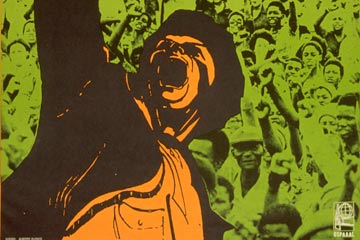The most successful class struggles in the last century came from the darker nations. Humble people made ripples that are still cascading. And lest we forget, the decolonization lexicon of self-determination draws from a revolutionary socialist tradition outside the first world.
Nick Estes, The Red Nation

Emory Douglas, OSPAAL
At our last session, we generated these important lessons. We hope they will be useful as you think about, and get to work changing the world.
Internationalism is essential to fighting imperialism.
- Third Worldism is still a useful political framework, even amid global changes and some triumphs of neo-colonialism and imperialism in the aftermath of ’68.
- Material solidarity, not just rhetorical, is crucial to internationalism.
- Thinking through the lasting impacts of the period on diasporic communities helps complicate our understandings of internationalism in helpful ways.
- Understanding ourselves as a majority provides a different orientation from which to develop strategy.
Creating (or taking advantage of) crises of hegemony can build the material and ideological power to confront oppressive forces.
- Our strategies must be born of strong understanding of economic crisis and political balance of forces on national and global scales.
- We have to believe that we can win.
Although worldwide revolution was not achieved in the ’68 period, much of the best parts of how we think and organize today are drawn from that period.
- The struggle continues and many of the stepping stones are still in play.
- It’s important for us to consider how we think about time. Ours is a protracted struggle.
Art and culture are crucial elements of any fights for self-determination.
- The process of making revolution is a process of making culture and vice versa.
- If we want to win, we need to amplify our creativity.
No systemic gains are made against repressive power without meaningful struggles from below.
- We need to make a sustained commitment to building and supporting mass movements rooted in anti-war and anti-imperialist politics, led by oppressed people (including imprisoned organizers, some who have been held as political prisoners for decades), with tangible economic and social justice visions and programs, that work to redistribute economic, social, and political power.
- Anti-racism should be up-front in all of the above.
- Any momentum of the ’68 period was born of decades of struggle leading up to that period.
A sober analysis of the balance of forces is indispensable.
- Imperialism and militarized domination are not inevitable, even when the power balance is wildly uneven.
- Our analysis may still lead us to conclusions that are incorrect or that may not indicate how things will go.
- We should carefully analyze history’s lessons. This does not suggest that things remain the same or move in a straight line, but that the evolution of both repressive and liberatory forces is based on changing conditions, which we can assess over time to plan future steps.
